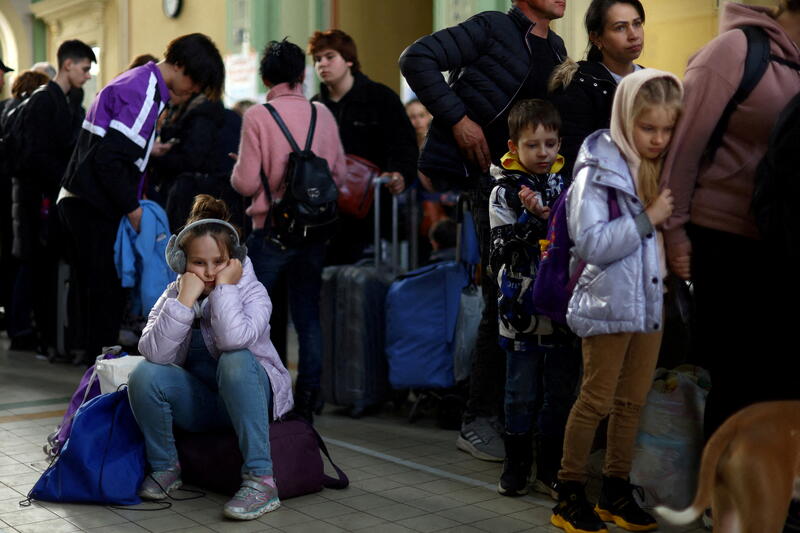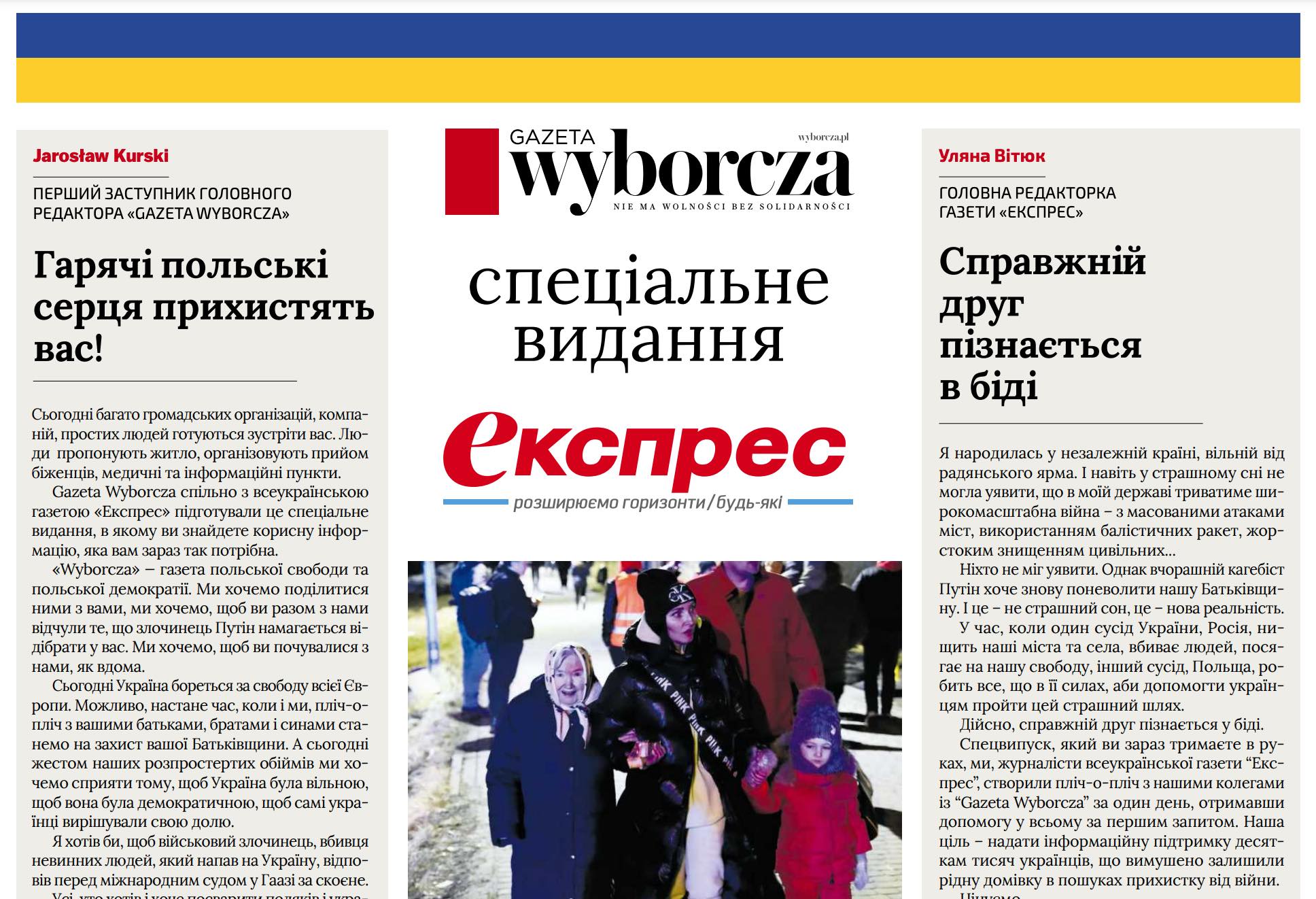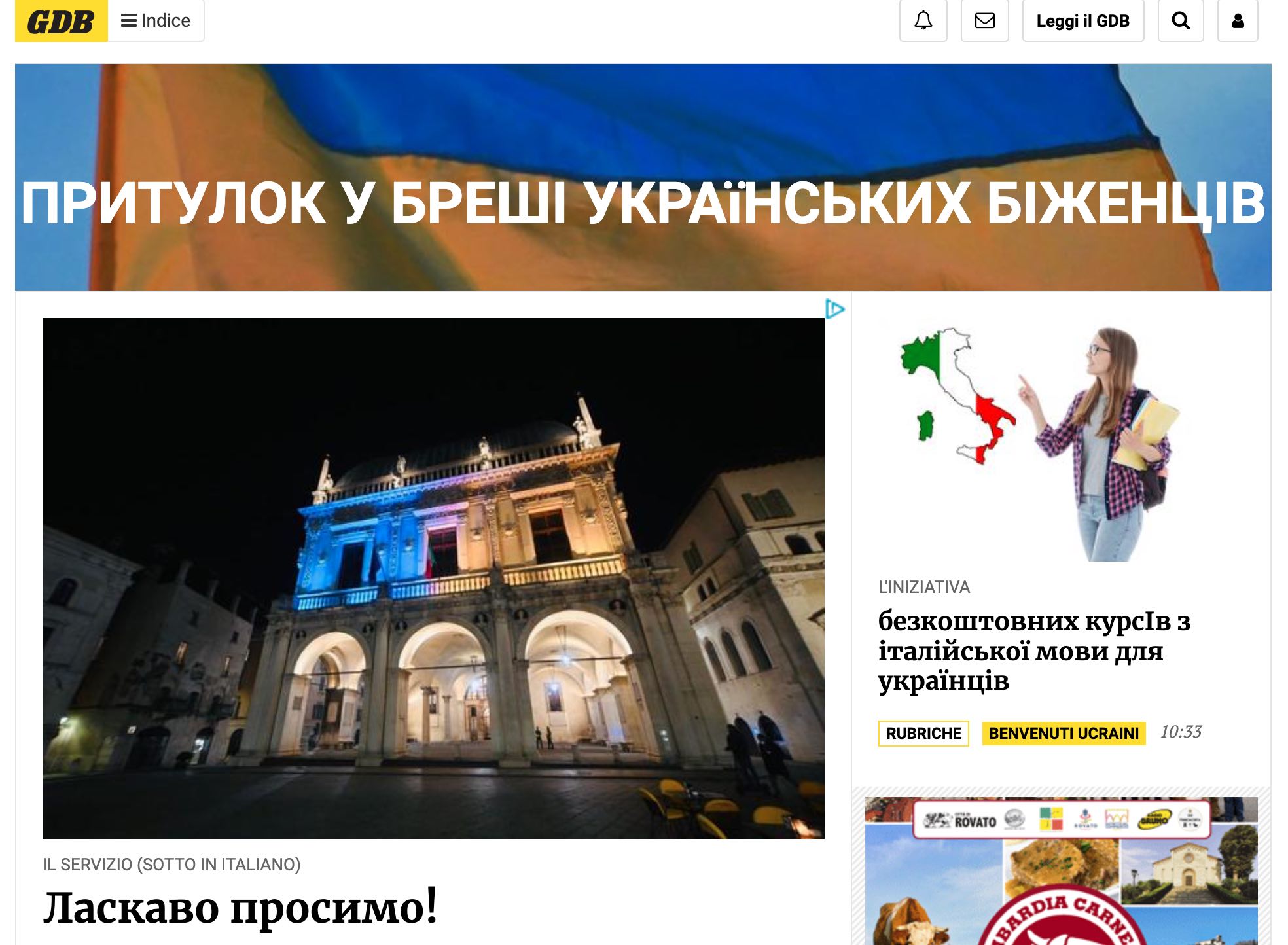How European news outlets are reaching Ukrainian refugees in their own language

Ukrainian refugees rest at Przemysl Glowny train station after crossing the border with Poland. REUTERS/Hannah McKay
According to UN figures, almost four million refugees have fled Ukraine since the war started. These people are now having to figure out how to access services, adapt to different customs and rebuild their lives in a foreign country.
Newspapers, news sites and public broadcasters across Europe are helping Ukrainian refugees with this transition by creating news products and publishing information in their own language. These media outlets are offering crucial details regarding issues such as claiming asylum, finding accommodation and accessing education and health services in their respective countries. I spoke with the journalists behind projects from Poland, Italy and Germany to know how they conceived their products and why they think they matter.
Poles and Ukrainians team up
One of the first outlets to create content for Ukrainian refugees was Polish daily Gazeta Wyborcza. Their journalists collaborated with Ukrainian Lviv-based broadsheet Expres to publish a free special issue of the newspaper in Ukrainian to hand out to refugees crossing the border.
Polish media company Agora, Gazeta Wyborcza’s owner, has since continued its partnership with Expres by launching Ukrayina.pl, the product of a collaboration by the team behind Gazeta.pl news portal and Expres editorial team. Ukrayina.pl is an Ukrainian-language website with news about the war and information that refugees may need to settle into Poland.

“These people were not preparing for such a page of life,” said Uliana Vitiuk, editor-in-chief of Expres and Ukrayina.pl. “They have no plan on how to live. Yesterday they were in peaceful Kharkiv or Kyiv and today they are forced to live in new circumstances, hundreds or thousands of kilometres from home. Our goal is to help these people. We write about what is important now for Ukrainians in Poland. We communicate with them and monitor specialised groups on social networks. That's how we know what worries them.”
Ninety percent of Vitiuk’s team works from Ukraine. “We continue to publish the Expres newspaper, the largest Ukrainian-language newspaper, and we are also working on the site Ukrayina.pl,” she says. However, we already see many talented journalists who, by fate, lost their jobs and live in Poland now. We plan to involve them in our new projects.”
According to UN figures, as of March 28 there are well over two million Ukrainian refugees in Poland. Most Ukrainians, Vitiuk said, do not speak Polish. The languages are similar in some ways, but not enough to ensure full understanding. “When you are looking for important information for yourself or for your child, you want to understand everything from A to Z,” Vitiuk said.
Vitiuk also highlighted the importance of language to people forced to flee their country: “Reading the news in your native language [when you are] in a new country is morally important. This makes it easier to adapt to new realities of life. You feel at home. You know that you are taken care of here. You are not alone.”
Other Polish media outlets have also started their own subsections in Ukrainian, including Kraków-based Onet.pl and online culture magazine dwutygodnik.com.
A public broadcaster in Germany
Western Europe has taken in far fewer refugees than Poland. At the end of March, Germany had received around 300,000 people, Italy 70,000 and France 30,000. However, several media outlets in these countries, from public broadcasters to local newspapers, are also rallying to help refugees.
On 26 March Italian public broadcaster RAI started showing a daily TV news bulletin in Ukrainian on its 24 hours news channel. The five-minute broadcast begins at 15:00 and covers updates about the war.
In Germany, Funk, a successful platform or younger audiences by public service broadcasters ARD and ZDF, has launched the new Instagram account How to Deutschland, whose posts are slides with text in German, English and Ukrainian. Over blue and yellow backgrounds, its 14,000 followers can find everything they need to know to settle in Germany.
The content for Funk’s social media accounts comes from media production company Skip Intro. Skip Intro’s newsroom leader and format developer Javan Wenz explained that they came up with the idea for the account while they hosted a Ukrainian friend of a friend, who needed a desk to keep working, in their Leipzig office.
“We just chatted a little bit and she told us that she had some problems. Like, ‘Why are the stores closed on Sunday here? Is this always the case?’ Things that are evident to Germans, but not to someone who just came here and didn't plan to come.”
Wenz and his team realised they could help by spreading the information that refugees needed to know. They used the main Funk Instagram account, with more than one million followers, to advertise the new How to Deutschland account. From then on, the account grew through word of mouth and through their posts being shared on Instagram stories. Wenz said their slides have even been printed out and displayed in temporary refugee shelters.
“We are in close contact with the community that exists now and they tell us about the problems they experience,” Wenz said. He’s also working with a Ukrainian journalist who helps pick the topics and translates the text. DMs and comments also shape the posts they share, from the first one in which they asked their audience what they wanted to see.
The account’s content is a mix of useful German vocabulary, practical tips relevant to life in Germany, and explanations of relevant policies and bureaucratic processes.
Skip Intro is not alone in its approach. In Spain, digital content agency Prodigioso Volcán is putting together illustrated guides for Ukrainian refugees in the country. A guide to healthcare is already available in a mobile version and a printable PDF, with more topics to come.
A local newspaper in Italy
Local newspapers have also responded to the refugee crisis. In France, the daily Nice-Matin published a page in Ukrainian with practical advice, including tips about accommodation and public services. In the northern Italian city of Brescia, the local newspaper Giornale di Brescia dedicated a section of their website to useful information for refugees in Ukrainian.
Anna Masera, the paper’s head of digital, said that the team were prompted to start this service as important information was available online but only in Italian. The newspaper teamed up with local Ukrainian translator Valeriya Zaverukha to publish articles detailing the services available for refugees in the local area.

The service is limited to the online newspaper as the cyrillic alphabet could not be printed in the physical copies. QR codes are included in print so people can access the information on the site. As for the content, reporters got in touch with refugee reception centres to ask what was needed.
“The community in Brescia is very welcoming to the refugees,” Masera said. “The newspaper wants to draw closer to the population also by offering services.”
All these initiatives were launched quickly and driven by immediate need. Unlike most news products, these services were not meticulously planned for months or years. They had to come together in weeks, if not days. Masera said that il Giornale di Brescia wants to update their service, adding more information. Wenz said that his team will re-evaluate in a couple of weeks, see if their product is still needed or if it needs to shift.
Vitiuk doesn’t know what the future holds for the publication, but said that their work will carry on for as long as it’s needed. “We do not know when the war will end. We do not know when these people will be able to return home. The houses of many of them were destroyed. Refugees are mostly women and children. I think they will stay in safe territory for as long as it’s needed. Maybe three months. Maybe a year. Or maybe longer. We will work for them as long as necessary. It is our mission – to help people,” she said.
In every email we send you'll find original reporting, evidence-based insights, online seminars and readings curated from 100s of sources - all in 5 minutes.
- Twice a week
- More than 20,000 people receive it
- Unsubscribe any time







